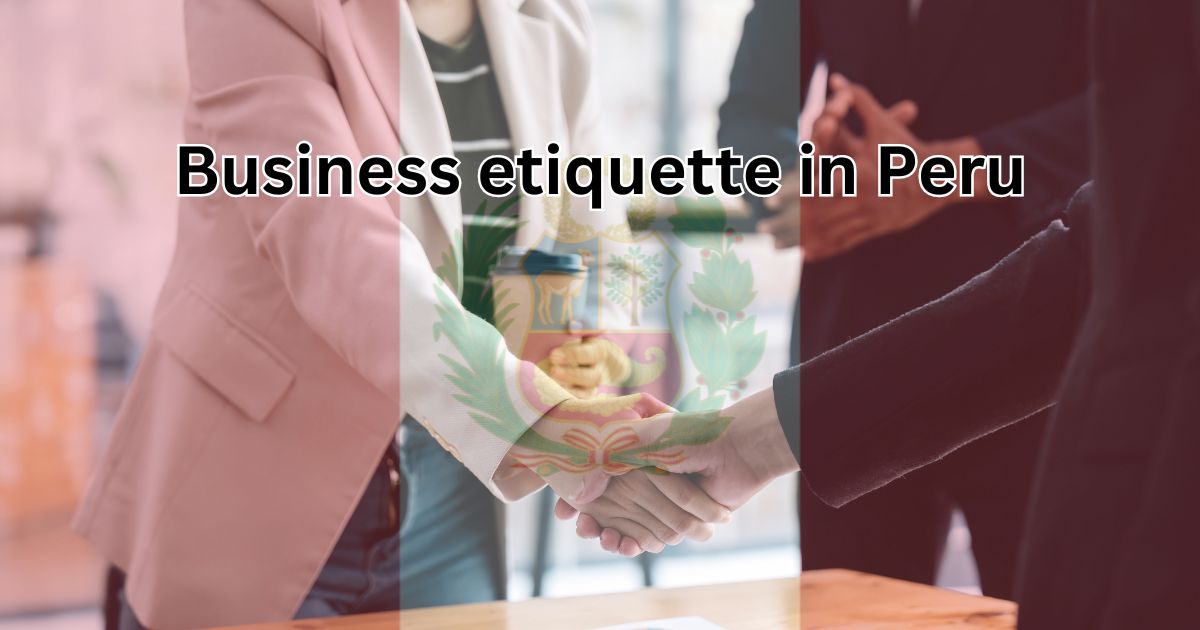Understanding business etiquette in Peru is essential for anyone looking to engage in professional activities in the country. The unique blend of traditional values and modern practices makes Peru an intriguing landscape for business. In this guide, we will explore the various aspects of business etiquette in Peru, offering insights and practical tips to help you navigate the Peruvian business environment with confidence.
Historical Background of Business Practices in Peru
Peru’s business practices are deeply rooted in its rich cultural heritage. The influence of indigenous cultures, particularly the Inca civilization, is still evident today. Spanish colonization introduced new economic systems and social structures, blending with indigenous traditions to create a distinct business culture. Over the years, Peru has evolved, embracing modern business practices while preserving its cultural essence.
The Peruvian Business Environment
Peru boasts a diverse and dynamic economy. Key industries include mining, agriculture, and tourism, which play a significant role in the country’s GDP. Additionally, emerging sectors such as technology and finance are creating new opportunities. However, doing business in Peru comes with its challenges, including bureaucratic hurdles and regional disparities. Understanding the economic landscape is crucial for successful business operations.
Understanding Peruvian Society and Culture
Peruvian society places a high value on social hierarchy and relationships. Respect for authority and elders is ingrained in the culture, influencing business interactions. Family ties are strong, and personal relationships often extend into professional settings. It’s also important to recognize regional cultural differences, as business practices may vary between coastal, highland, and jungle areas.
Key Principles of Business Etiquette in Peru
Respect and hierarchy are fundamental principles of business etiquette in Peru. Addressing people by their titles and surnames is a sign of respect. Building trust and long-term relationships is essential, as Peruvians prefer to do business with people they know. Formality and professionalism are valued, and maintaining a composed demeanor is important in all business interactions.
Also Read: What Companies Are in the Basic Industries Field
Meeting Etiquette
Scheduling meetings well in advance and confirming them a day before is a common practice in Peru. Punctuality is appreciated, though some flexibility is expected. Greetings are formal, typically involving a handshake, and addressing each person by their title and surname. Business attire is conservative, with suits being the norm for men and professional dresses or suits for women.
Communication Styles
Peruvians value clear and polite communication. Verbal communication is often indirect, with an emphasis on maintaining harmony and avoiding confrontation. Non-verbal cues, such as body language and facial expressions, are also significant. Effective listening skills are crucial, as it demonstrates respect and understanding.
Business Card Etiquette
Exchanging business cards is a common practice in Peru. Present your card with both hands or the right hand, with the Spanish side facing up. Take a moment to examine the card you receive before putting it away. This shows respect and appreciation for the person’s professional identity. Following up after exchanging cards with a thank-you note or email is a good practice.
Negotiation Tactics
Negotiations in Peru require patience and a focus on building relationships. Initial meetings may be more about getting to know each other than discussing business. Building rapport and trust is crucial before diving into negotiations. Be prepared to engage in small talk and avoid hard-selling tactics. Flexibility and a willingness to compromise are valued.
Gift-Giving Customs
Gift-giving is an important aspect of business etiquette in Peru. Small, thoughtful gifts such as local crafts or specialty items from your home country are appreciated. Avoid overly extravagant gifts, as they may be seen as inappropriate. Gifts are typically presented at the end of a meeting, wrapped nicely, and accompanied by a personal note.
Dining Etiquette
Business meals are a common way to build relationships in Peru. If invited to a business meal, it’s important to accept, as declining may be considered impolite. Table manners are similar to those in Western countries, but there are a few local customs to be aware of. For example, it’s customary to wait for the host to begin eating. Topics of conversation should be light and avoid sensitive subjects such as politics.
Dress Code and Appearance
Professional appearance is highly valued in Peru. Men typically wear dark suits and ties, while women wear suits or professional dresses. In some regions or industries, business casual may be acceptable, but it’s always best to err on the side of formality. Personal grooming is also important, as it reflects respect for oneself and others.
Business Ethics and Corporate Social Responsibility
Ethical business practices are crucial in Peru. Transparency, honesty, and integrity are highly valued. Corporate social responsibility (CSR) is becoming increasingly important, with many companies focusing on sustainable practices and community engagement. Addressing ethical dilemmas with a clear, principled approach is essential for maintaining a good reputation.
Navigating Business Protocol
Understanding and following formalities and procedures is key to successful business operations in Peru. This includes knowing when to use intermediaries or advisors, who can help navigate local regulations and business customs. In the event of conflicts or disputes, a respectful and diplomatic approach is essential. Mediation and compromise are preferred methods of resolution.
Women in Business
Women are playing an increasingly prominent role in the Peruvian business environment. While challenges such as gender bias still exist, there are many opportunities for women professionals. Success stories of women business leaders serve as inspiration, highlighting the potential for growth and achievement in various industries.
Leveraging Technology in Business
The use of digital tools and platforms is on the rise in Peru, impacting business practices significantly. From communication and collaboration tools to advanced data analytics, technology is enhancing efficiency and innovation. Staying updated with the latest tech trends and integrating them into your business strategy can provide a competitive edge.
Networking and Building Connections
Networking is a vital part of doing business in Peru. Personal connections and referrals are highly valued, and attending networking events and joining professional organizations can open doors to new opportunities. Effective networking involves not only exchanging contact information but also following up and nurturing relationships over time.
Case Studies of Successful Business Practices
Examining case studies of successful businesses in Peru can provide valuable insights. For example, the growth of the mining industry, the success of agricultural exports like coffee and avocados, and the booming tourism sector all offer lessons in strategic planning and market adaptation. Learning from these examples can inform your own business strategies.
Common Mistakes to Avoid
Avoiding cultural faux pas is crucial when doing business in Peru. Common mistakes include showing impatience, being overly direct, or neglecting to build personal relationships. Misunderstandings in communication can also arise, so it’s important to be attentive and respectful. By understanding and respecting local customs, you can avoid these pitfalls and build successful business relationships.
Conclusion
In conclusion, understanding business etiquette in Peru is essential for successful professional interactions. Respecting cultural norms, building strong relationships, and maintaining professionalism are key elements of the Peruvian business environment. By embracing these practices, you can navigate the business landscape in Peru with confidence and achieve your professional goals.
FAQs
1. Why is understanding business etiquette important in Peru?
Understanding business etiquette in Peru is crucial because it helps build strong professional relationships, fosters trust, and ensures smooth business operations. Knowing the cultural norms and practices can prevent misunderstandings and demonstrate respect for local customs.
2. How important are personal relationships in Peruvian business culture?
Personal relationships are extremely important in Peruvian business culture. Trust and familiarity often take precedence over formal agreements. Building and maintaining strong personal connections can significantly impact business success.
3. What should I wear to a business meeting in Peru?
Business attire in Peru is generally conservative. Men should wear dark suits and ties, while women should opt for professional dresses or suits. It’s always better to dress more formally, especially for initial meetings.
4. How should I address colleagues and business partners in Peru?
Always address colleagues and business partners by their titles and surnames. Using titles such as “Señor” (Mr.) or “Señora” (Mrs.) followed by the surname is a sign of respect. Avoid using first names unless invited to do so.









